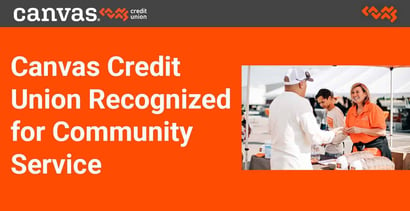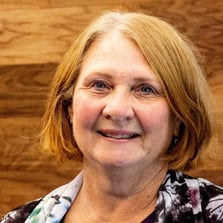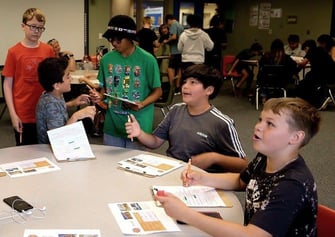
In a Nutshell: People have different financial priorities at different stages of life. For example, most high schoolers are less concerned with investing than planning for the responsibilities of early adulthood. That’s why Colorado-based Canvas Credit Union strives for a “something for everyone” approach to financial education and member services. From middle school on, Canvas Credit Union meets members and communities where they are with education and products that benefit them. That practical approach to increasing financial well-being earns the credit union our Editor’s Choice™ Award.
As member-owned not-for-profit financial cooperatives, credit unions are all about people helping people. That usually includes a commitment to financial education.
But how credit unions go about promoting financial education differs widely. Some focus on supplementing school instruction, while others emphasize reaching out to the community. Others target members with products to ensure they have the best chance to improve their financial standing.
At Canvas Credit Union, a $4 billion institution with 35 branch locations serving nearly 300,000 members across Colorado, the team decided to cover all the bases.
That includes school instruction, partnerships with nonprofits and select employer groups, programs in libraries and churches, and creative lending products that elevate students and members most in need. It’s a comprehensive approach that Senior Community Involvement Specialist Nancy Patton said is the result of a goal spearheaded by CEO Todd Marksberry: Helping People Afford Life in Colorado.

“Culture change has helped our credit union explode with community giving and financial education,” Patton said. “Not coincidentally, we’ve also expanded beyond our base in Denver — north, south, and west.”
Expansion happens when members feel well served, of course, but Canvas approaches financial education as an end in itself. That starts by acting like a credit union, not a big bank.
For example, Patton recently received a request from an educator at an alternative school for struggling middle school students.
“It can be a challenge to engage middle schoolers in financial education, and particularly challenging to engage students at an alternative school who may not be exposed to financial education at home,” Patton said. “So we were especially motivated to help them.”
Taking the right approach to learning in schools and communities earns Canvas our Editor’s Choice™ Award.
Preparing Young People for Adult Responsibilities
Canvas reaches middle schoolers in the Fort Collins area through a partnership with the Boys & Girls Club of Larimer County. The Canvas community involvement team helps students understand financial responsibility and explore workforce options in a summer program that can earn them five high school credits.
“That’s big,” Patton said.
High schoolers receive their share of attention through My Future Money Life, a simulation exercise where students navigate real-life financial challenges. As of the 2023 holiday season, Patton said Canvas had participated in 80 simulations during the school year, reaching more than 2,000 participants.

In the simulation, students receive an occupation, a family size, and a credit score and visit various stations to make choices relating to transportation, housing, clothing, food, and other categories. At each station, they decide how much they will spend each month on that item.
The students are required to save 10% of their income. Then the fun begins. Teachers love giving out surprise cards announcing unexpected financial setbacks.
“We set some of them up to fail — it’s particularly difficult if you’re a single parent and have a low income,” Patton said.
The surprise cards introduce events such as a pet iguana requiring a $200 veterinary visit. Other unanticipated problems dealt by the cards include locking their keys in their car, getting a flat tire, and an unexpected death in the family requiring a $500 flight.
Patton frequently visits classrooms to engage in less structured instruction to supplement a teacher’s financial education regimen. Sometimes, a colleague will accompany her to tell stories about on-the-job scenarios they encounter.
“It’s real-life stuff, for sure,” Patton said. “We really try to make it resonate with what the teacher has been doing all week long.”
Tailored Workforce and Community Education
Canvas started in 1938 as a credit union for employees of the Denver-based Public Service Company of Colorado, and the connection to employer groups still runs deep. Its 2018 name change to Canvas Credit Union reflected its renewal as an institution: Members paint their financial futures as if starting from a blank canvas.
Canvas maintains partnerships with select employer groups and provides membership privileges that carry a financial education component. When Patton and her colleagues aren’t in classrooms, they often participate in financial wellness sessions at corporate sites.

Companies invest in financial wellness as an employee benefit. It’s a win-win situation because employees who don’t feel stressed about money are naturally more productive and happier.
Canvas also partners with libraries in northern Colorado to provide community-based education. Patton speaks with pride about how these library partners trust the team to engage the audience in the concepts under discussion without pitching products. The same will be true when Canvas offers financial education in a church facility in 2024.
“They had been stung by someone in the past,” she said. “It’s been a very cautious review of the content, a very thoughtful process so that we don’t do another hurt.”
Canvas also partners with nonprofits such as a group that helps military veterans improve their finances.
Many of these classes produce moments of realization and clarity in the audience. For example, audience members were thrilled to gain a more comprehensive understanding of the financial world during a recent session with a low-income housing group.
“That’s one of the ones that’s near and dear to my heart,” Patton said.
Products That Help Those Who Need It Most
Canvas will teach 350 total classes in 2023, reaching more than 7,000 individuals, including middle and high school students, employees, nonprofit groups, and library patrons.
But for all its emphasis on financial education in schools and out in the community, Canvas also reserves attention for members who may be starting their financial journey or struggling due to a setback.
In addition to providing members with free financial success seminars and online learning modules, Canvas helps with products like Secured Loans. For a $500 minimum in collateral, members can earn interest through a savings account as they build credit; they can earn higher interest by depositing a minimum of $1,000 in a certificate of deposit.
The credit union also offers an Overdraft Line of Credit that is free, cheaper than a credit card, and revolving, so it increases the member’s spending capacity.
A Next Level Savings Account pays 5% interest and is among the many benefits the credit union offers Colorado State University students, faculty, staff, and alums.
Members can use a Reverse Tier Savings Account that pays 5% on the first $2,000 they deposit. It’s the opposite of the conventional approach to high-yield savings, which reserves the higher interest tiers for those who deposit higher amounts.
Meanwhile, as if Patton weren’t busy enough, she participates in a credit union financial education roundtable to share best practices and gain industry insights. On the docket is a meeting with a roundtable colleague to discuss university-related products similar to those Canvas offers members associated with Colorado State.
“We’ll share ideas and talk about what’s working,” Patton said. “It’s exemplary of how credit unions approach this kind of thing.”






